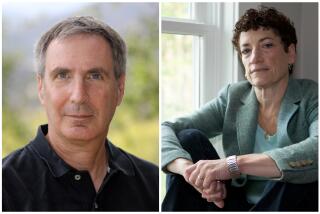A Little ‘Greed’ Isn’t So Bad
- Share via
The aim of “Greed With John Stossel,” a one-hour program on ABC tonight, is to persuade you that Bill Gates, Ted Turner and Silicon Valley entrepreneurs did not make their billions at your expense.
On the contrary, they enriched you in the act of creating wealth for themselves. Thus does Stossel, the ABC reporter known for an original bent on “20/20,” explain economics to the masses in a program that mostly succeeds.
Stossel, in reporting how a steak got from the cattle lots of Texas to his supermarket in New York, illustrates the principle of enlightened self-interest at the heart of our economy: That each person working in his or her own interest makes goods available to the greatest number at the most economical price and thereby serves the common good.
It is the principle of capitalism, which doesn’t often get mentioned much less explained on television. Capitalism is mentioned in this program, sometimes correctly as the process that keeps money on the move and economies growing, and other times incorrectly as a mere piling up of riches.
From the start, Stossel is out to show that the economy is not an engine of greed, a zero-sum game, but a complex mechanism with surprising consequences.
In the show’s best segment, he interviews Steve Mariotti, a New York export-import broker who quit to teach high school in a poor neighborhood and found that the subject most inspiring to his students was his export-import business. The students were fascinated, as one of them put it, that Mariotti could “bring in ladies’ shoes from India at $5 a pair, add a dollar for insurance and freight and sell ‘em for $7 on the Lower East Side.” They were fascinated, the program declares, because they saw news they could use.
Stossel puts economist David Kelley on camera to say it well: “It’s the people at the bottom who need the system in which everyone is free to trade and pursue money because capitalism opens up opportunities to climb up that economic ladder.”
Stossel follows by putting Jimmy McNeil, a student of Mariotti who started a music business, on camera to say it more succinctly: “Somewhere along the line, Bill Gates started out with zero; somewhere along the line Quincy Jones started out with zero. It’s not a color thing, it’s an opportunity thing.”
However, the program, having made a good point, goes astray in dismissing income disparities in the contemporary economy instead of inquiring why they occur. And it goes completely off the rails in a closing segment that asks the provocative question: “Who did more for the world, Michael Milken or Mother Teresa?” The commentators favor Milken because his financial innovations helped create tens of thousands of jobs.
But the correct answer is that the two are not comparable. Milken forged a new stream in the economy’s river by correctly discerning an anomaly in traditional financial practices. He raised millions and enabled many successful companies to survive or get started. He also broke securities laws, served two years in prison, and today heads foundations that support cancer research and research into the workings of the economy.
Mother Teresa, on the other hand, tended to poor, sick and dying people left out by the world’s economies. Her labors speak to the mystery of our existence on Earth, which is far more of a puzzle than the economy--as Milken would be the first to recognize.
Still, the bottom line is that Stossel, acting in his own self-interest as a widely curious reporter, has served the common good.
*
* “Greed With John Stossel” airs at 10 tonight on ABC (Channel 7).


